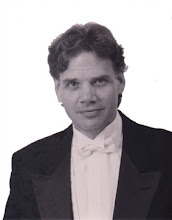I was very pleased that we were able to make such progress on the "Great Doxology " (Rachmaninov movement 12). That movement is in itself a major undertaking; it was so satisfying to hear the group starting to absorb some of its richness. There are many beautiful moments in that piece, but one favorite for me is measure 73. In the passage leading up to that moment, we are singing, "Let Thy mercy, O Lord, be upon us, as we have set our hope on Thee." While we had been predominantly in E Flat, on the word "Tia" (Thee), we arrive at that sublime G Major chord. That tertian relationship (from E Flat major, moving up a third to G Major) has such a mind-bending effect. (Granted, C minor is interposed in m. 70, but G Major and E Flat major are close enough together in time for the tertian effect to be present). Coming before God -- or that which is holy, or larger, more majestic than we are -- translate it in a way that might work for you if the religious phraseology is off-putting for you -- coming into this presence, we are transformed, thrown into a new key. Tallis's Spem in alium, you'll remember, has a similar moment at the climax of the work where the material in C major abruptly ends, and suddenly all forty voices enter with an A Major chord -- again, the tertian relationship, this time moving downward. The passage that follows in the Tallis intones "look upon our humility" (respice humilitatem nostram). In the Rachmaninov, the altos offer a supplication that is similarly humble, and filled with the desire to find the right path in life ("teach me your statutes"). I know that most in the choir are not religious; I hope nonetheless that we can still probe this work with some intensity, and that the emotional and spiritual journey that takes place within it can be absorbed by each individual.
Nice job also on Anders Paulsson's "Deep River." It will be fun to put this together with the jazz saxophone with Damani on Thursday.
 Here's the poster for our October 2 concert, "Mrs. Winter's One Giant Leap for Humankind."
Here's the poster for our October 2 concert, "Mrs. Winter's One Giant Leap for Humankind."



